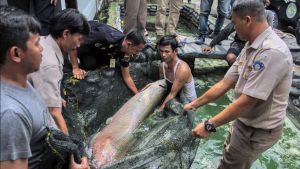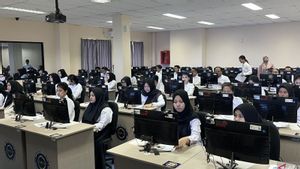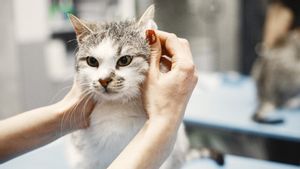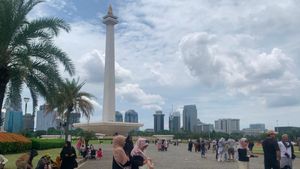JAKARTA - Commission III of the DPR encourages law enforcers to use a humanist approach to residents who maintain protected animals. Environmental crimes that are minimal in education, let alone do not mean to be commercialized, should only be given administrative law.
"This is an alarming matter and raises many questions about the implementation of conservation laws in Indonesia. In cases like this, criminal application should be the last resort because they don't know how to maintain protected animals," said Member of Commission III of the Indonesian House of Representatives Gilang Dhielafararez, Thursday, September 12.
As is known, Sukena was initially arrested by the Bali Police Ditreskrimsus for raising hedgehogs on March 4, 2024. The four hedgehogs that Sukena kept were Javanese hedgehog or Hystrix javanica species. Sukena obtained a squirrel that had thick hair and was in the shape of a sharp thorn from her in-laws. The soil was initially only two tails, then Sukena kept it until it increased by two.
Sukena was charged with violating Article 21 paragraph (2) of Law Number 5 of 1990 concerning Conservation of Biological Natural Resources and their Ecosystems (UU KSDAE) with a penalty of 5 years in prison. Currently, the case is P21 and Sukena is undergoing trial at the District Court (PN). Sukena received a lot of support from netizens because her video crying hysterically while attending a viral trial on social media.
Apart from Sukena, a 61-year-old grandfather in Malang named Piyono was sentenced to 5 months in prison for raising an alligator fish. The trial of the verdict against Piyono who was charged with violating Article 88 in conjunction with Article 16 paragraph 1 of Law Number 31 of 2004, concerning Fisheries and Regulation of the Minister of Marine Affairs and Fisheries Number 19 of 2020 was held at the Malang District Court on 9 September.
When he was sentenced to 5 months in prison, Piyono, who was an elderly person, cried because he did not know there was a rule to prohibit raising the alligator fish. Gilang assessed that cases like this show that the law does not side with the small people.
SEE ALSO:
"The rise of residents who are convicted of ignorance or negligence in raising rare animals is very tearing the sense of justice of the community, in the midst of many corruption cases which are actually lightly punished, and also allegations of gratification of officials or family officials who are ignored by law enforcers," he said.
"How can an negligence in raising rare animals be punished more severely than corruption which is planned to steal people's money," added Gilang.
The member of the House of Representatives Commission in charge of legal affairs said that environmental criminal cases such as Sukena and Piyono's grandfather should pay attention to the principle of ultimum remedium where criminal penalties are the last resort. Gilang assessed that administrative sanctions would be more appropriate.
"Because these protected animals are not traded, and they also maintain ignorance of the rules. The sanctions should be more coaching," said the legislator from the Central Java II electoral district.
In the case of Sukena and Piyono's grandfather, the restorative justice approach cannot be applied because there are no victims who are harmed. The case of maintaining protected animals is qualified as a violation of criminal administrative law with a cumulative criminal threat, namely imprisonment and fines.
"Law enforcement should be wiser. Just apply administrative sanctions, such as fines as part of environmental prevention and recovery," explained Gilang.
According to him, the ultimum remedium principle is very much needed in cases such as what happened to Sukena and Piyono's grandfather. Gilang called it to ensure that law enforcement was carried out fairly and proportionally.
"This case can be a lesson for all parties about the importance of understanding and complying with conservation laws, but also about how laws are applied wisely," he explained.
"And even though there is a criminal threat, they are not criminal criminals, let alone harm state money. Law enforcement officials should not be too stiff to see only black and white," added Gilang.
On the other hand, the Deputy chairman of the House of Representatives' Inter-Parliamentary Hardness Agency (BKSAP) assessed that the case of Sukena and Piyono's grandfather showed that there was still weak education about protected animals. For this reason, Gilang assessed that education and socialization related to protected animals should be carried out more massively to the community.
"The case of Nyoman Sukena and Piyono's grandfather shows that there is a need to increase public awareness about law and environmental protection, as well as adjust the legal implementation with social and economic conditions of the government," he said.
A similar case occurred in 2019 that happened to I Ketut Purnita. He was sentenced to 6 months in prison and a fine of Rp. 5 million with a subsidiary of 4 months in prison in a case of maintenance of endangered and protected animals in his home without official permission.
Purnita has been proven to maintain various birds protected by the government and rare. The birds it maintains are two predators, 1 cenderawasih, 1 hornbill, and an eagle or eagle.
Gilang also emphasized that legal justice for the people needs to be considered in this kind of case. Law enforcers must look at the motives and reasons for what these rare animals are being kept.
"By maintaining protected animals, it can prove that there is no malicious intent. Law enforcers must have a conscience, and this needs to be a note so that there is no unequal legal opinion against the underprivileged," concluded Gilang.
The English, Chinese, Japanese, Arabic, and French versions are automatically generated by the AI. So there may still be inaccuracies in translating, please always see Indonesian as our main language. (system supported by DigitalSiber.id)

















